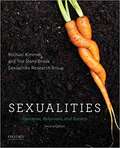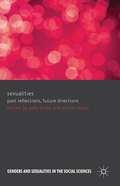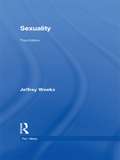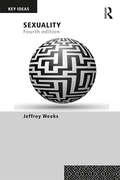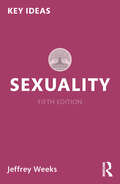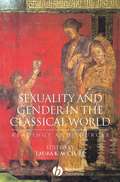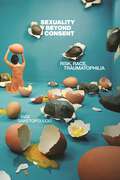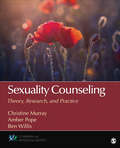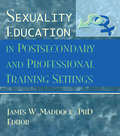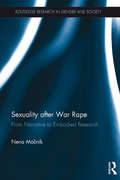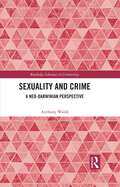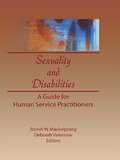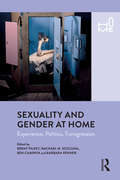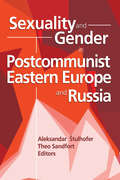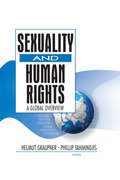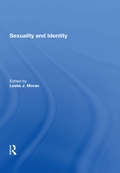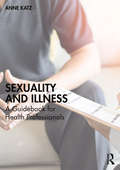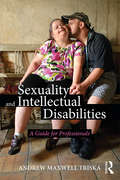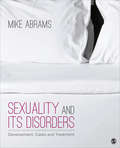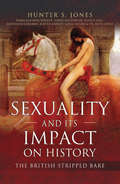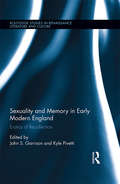- Table View
- List View
Sexualities: Identities, Behaviors, And Society
by Michael Kimmel The Stony The Stony Brook Sexualities Research GroupThis anthology on sexuality addresses such key questions as: How are sexualities socially constructed? Why are sexualities more than just natural "urges"? and How are sexualities personal, social, and political? Using multiple disciplines, international populations, and theories to explore sexualities, it opens with classical and contemporary theories, and then explores the ways in which we learn about sexual activities and develop sexual identities. Sexualities: Identities, Behaviors, and Society has a strong sociological approach, but also considers other important perspectives (psychology, biology, history). It is rigorous, yet accessible and engaging, covering classical and contemporary arguments and perspectives.
Sexualities: Past Reflections, Future Directions
by Yvette Taylor Sally HinesThis collection examines recent theoretical and methodological debates, shifts in law and policy, and social and cultural changes around sexuality. It sets out new ways of conceptualizing and researching sexuality and explores persistently marginalised and re-traditionalised sexual practices, subjectivities and identities.
Sexuality
by Jeffrey WeeksFor over twenty years, Sexuality has provided a cutting edge introduction to debates about sexualities, gender, and intimate life. Previous editions included pioneering discussions of the historical shaping of sexuality, identity politics, the rise of fundamentalism, the social impact of AIDS, the influence of the new genetics, ‘global sex’, queer theory, ‘sex wars’, the debates about values, new patterns of intimacy, and much more. In this new edition, Jeffrey Weeks offers a thorough update of these debates, and introduces new concepts and issues. Globalization is now a key way of understanding the reshaping of sexual life, and is discussed in relation to global flows, neo-liberalism, new forms of opposition, cosmopolitanism and the heated debates around sex trafficking and sex tourism. Arguments about the regulation and control of sexuality, and the intersection of various dimensions of power and domination are contextualised by a sustained argument about the importance of agency in remaking sexual and intimate life. In particular, new forms of Lesbian, Gay, Bisexual, Transgender and Queer politics, and the high impact of the debates about same-sex marriage are explored. These controversies, in turn, feed into debates about what is ‘transgressive’, ‘normal’, ‘ordinary’; into the nature of heter-normativity; and into the meanings of diversity and choice. To conclude, the book turns to questions of values and ethics, recognition, sexual citizenship and human sexual rights. This book displays the succinctness, clarity and comprehensiveness for which Jeffrey Weeks has become well known. It will appeal to a wide range of readers internationally.
Sexuality
by Jeffrey WeeksWe are almost programmed into thinking of our sexuality as a wholly natural feature of life. But sexual relations are but one form of social relations, as Jeffrey Weeks makes clear in his book. Drawing on the analyses of Michel Foucault, amongst others, the book examines the social, moral and political issues raised by contemporary forms of sexuality. Weeks provides an authoritative introduction to the sociology of sexuality, discussing its cultural and socio-historical construction, it's relationship with power and the State's involvement in its rationalisation and regulation. This second edition is also updates to include global and postcolonial perspectives on sexuality, queer theory, the internet and cybersex, AIDS as a global phenomenon and international debates on the politics of sexuality. This book is an indispensable introduction to this complex and expanding field.
Sexuality
by Jeffrey WeeksThe new edition of Sexuality displays the qualities which have made this book a key text for understanding human sexuality. Jeffrey Weeks blends deep empirical knowledge with theoretical sophistication and a sensitivity to the politics of sexuality. Framing and shaping the analysis is an acute understanding of the world-wide changes that are remaking sexuality and gender, dramatized by the globalization of sex and the rise and rise of cybersex. These changes have opened unprecedented opportunities for sexual interaction and sexual choice, but also posed new sexual dangers and anxiety. Debates about the regulation and control of sexuality, and the intersection of various dimensions of power and domination are contextualised by a sustained argument about the importance of agency in remaking sexual and intimate life, above all for women and for LGBTQ people. Particular attention is given to the debates about same-sex marriage which symbolize the transformations that have taken place. These controversies in turn feed into debates about intimate citizenship and human sexual rights in a rapidly changing world.
Sexuality (Key Ideas)
by Jeffrey WeeksSexuality is the fifth revised and updated edition of the classic text for understanding human sexuality. This new edition brings the arguments and evidence fully up to date and explores their implication for many topical controversies, around LGBTQ+ rights, the trans experience and gender fluidity, same-sex marriage, sexual autonomy and consent, and the meanings of sexual choice. Since it was first published in the 1980s, Sexuality has been at the cutting edge of the study of the social and historical meanings of sexuality. Blending deep empirical knowledge with theoretical sophistication and an acute sensitivity to the politics of sexuality, the book offers an informed framework for understanding the complexities of sexual life. A key insight of the book is that the ways we think and speak about sexuality make a major contribution to the ways we live it. Sexuality may be rooted in biological possibilities, but it is shaped and experienced through languages and meanings which are inevitably historical and social in nature. The book explores with clarity and precision the invention and re-invention of sexual meanings, the question of what constitutes a true sex and the biological and social roots of sexual difference, the challenges of diversity, the re-making of sexuality as a highly divisive political subject and the implications of the transformation of intimate life in the past few generations. These are seen in the context of profound changes that are re-fashioning the world, especially globalisation, cyber-sex, and the rise of new forms of agency, including among women and LGBTQ+ people, which have fed into new claims for sexual human rights. This new edition of Sexuality will be an indispensable guide for students in the social sciences with an interest in the ever-changing worlds of sexuality.
Sexuality And Gender In The Classical World: Readings And Sources (Interpreting Ancient History)
by Laura McClureThis volume provides essays that represent a range of perspectives on women, gender and sexuality in the ancient world, tracing the debates from the late 1960s to the late 1990s.
Sexuality Beyond Consent: Risk, Race, Traumatophilia (Sexual Cultures)
by Avgi SaketopoulouRadical alternatives to consent and traumaArguing that we have become culturally obsessed with healing trauma, Sexuality Beyond Consent calls attention to what traumatized subjects do with their pain. The erotics of racism offers a paradigmatic example of how what is proximal to violation may become an unexpected site of flourishing. Central to the transformational possibilities of trauma is a queer form of consent, limit consent, that is not about guarding the self but about risking experience. Saketopoulou thereby shows why sexualities beyond consent may be worth risking-and how risk can solicit the future.Moving between clinical and cultural case studies, Saketopoulou takes up theatrical and cinematic works such as Slave Play and The Night Porter, to chart how trauma and sexuality join forces to surge through the aesthetic domain. Putting the psychoanalytic theory of Jean Laplanche in conversation with queer of color critique, performance studies, and philosophy, Sexuality Beyond Consent proposes that enduring the strange in ourselves, not to master trauma but to rub up against it, can open us up to encounters with opacity. The book concludes by theorizing currents of sadism that, when pursued ethically, can animate unique forms of interpersonal and social care.
Sexuality Counseling: Theory, Research, and Practice (Counseling and Professional Identity)
by Christine E. Murray Benjamin T. Willis Amber L. Pope"Sexuality Counseling: Theory, Research, and Practice is an important resource for mental health practitioners. Sexuality is complex and rather than attempting to simplify, this book works within that complexity in a well-organized and comprehensive way." - Alexandra H. Solomon, Northwestern University Providing a comprehensive, research- and theory-based approach to sexuality counseling, this accessible and engaging book is grounded in an integrative, multi-level conceptual framework that addresses the various levels at which individuals experience sexuality. At each level (physiological, developmental, psychological, gender identity and sexual orientation, relational, cultural/contextual, and positive sexuality), the authors emphasize practical strategies for assessment and intervention. Interactive features, including case studies, application exercises, ethics discussions, and guided reflection questions, help readers apply and integrate the information as they develop the professional competency needed for effective practice.
Sexuality Counseling: Theory, Research, and Practice (Counseling and Professional Identity)
by Christine E. Murray Benjamin T. Willis Amber L. Pope"Sexuality Counseling: Theory, Research, and Practice is an important resource for mental health practitioners. Sexuality is complex and rather than attempting to simplify, this book works within that complexity in a well-organized and comprehensive way." - Alexandra H. Solomon, Northwestern University Providing a comprehensive, research- and theory-based approach to sexuality counseling, this accessible and engaging book is grounded in an integrative, multi-level conceptual framework that addresses the various levels at which individuals experience sexuality. At each level (physiological, developmental, psychological, gender identity and sexual orientation, relational, cultural/contextual, and positive sexuality), the authors emphasize practical strategies for assessment and intervention. Interactive features, including case studies, application exercises, ethics discussions, and guided reflection questions, help readers apply and integrate the information as they develop the professional competency needed for effective practice.
Sexuality Education in Postsecondary and Professional Training Settings
by James Wm MaddockSexuality Education in Postsecondary and Professional Training Settings keeps you up-to-date on the trends and issues in sexuality education in colleges, universities, and professional training institutions. A diverse group of authors, all experienced sexuality educators, offers summary information, critical commentary, thoughtful analysis, and projections of future trends in sexuality education in postsecondary settings. This keeps you current on the status of sexuality education and will move you to consider a variety of concerns and challenges in designing and implementing sexuality education courses and programs. Finally, the chapters present you with valuable resources, ranging from historical references to contemporary website information.Beginning with an historical perspective on twentieth-century sexuality education, Sexuality Education in Postsecondary and Professional Training Settings includes information on the nature and extent of sexuality education in contemporary colleges and universities, as well as in institutions training teachers, clergy, and physicians. The book's expert authors analyze undergraduate curricular and pedagogical issues, as well as problems in classroom climate and the challenges of meeting objectives for behavioral change. Specific topics you learn about include:guidelines for teaching undergraduate sexuality courses--with a focus on philosophical issues; how to develop objectives and implement teaching strategies; print, media, and Internet resources for teaching; and commentary on controversial issues effects of various workshops on the contraceptive-related attitudes and behaviors of college studentssexuality education and HIV/AIDS prevention education in teacher preparation institutionsperceptions of faculty regarding curriculum and approaches to sexuality education in clergy training institutionssexuality education in medical school curricula in the U.S. and Canada Sexuality Education in Postsecondary and Professional Training Settings is a valuable guide for sexuality educators in postsecondary settings and educators in corollary areas such as health education, educational psychology, family education, or curriculum development. Also an informative and useful text for scholars, researchers, professionals, and students in the fields of sexuality education, behavioral sciences, applied social sciences, and social policy, this book presents a variety of philosophical and methodological approaches to vital issues, ranging from qualitative phenomenological and interpretive methods to quantitative analyses to critical essays.
Sexuality Reimagined: MSM in Modern India
by Shailja TandonThe book examines how medical knowledge is produced around bodies that do not fit in the heteronormative framework of the state’s rationale and processes. The marginal bodies studied in this research are termed MSM, men who have sex with men, categorized as a high-risk group in the backdrop of HIV/AIDS. These Queer bodies entered the registers of epidemiology and governmentality. This classification is the point of departure for the book. The book interrogates and asks how does a sexual subject become a political question? To answer this political trajectory, the book analyses the category of risk in biomedicine. It investigates how the category of risk becomes critical to the Indian state’s rationale and policies wherein, through the ambit of health and population, sexuality is managed. Unearthing the sexual politics in South Asia, the book, based on rich empirical evidence derived from the lived experiences of MSM, narrates the construction of sexual subjectivity and masculinity. The process of construction occurs in negotiation with the Indian state, bringing forth the dimension of the Indian state as a medico-legal governmentality regime and how MSM takes on the identity of a medicalized subject.
Sexuality after War Rape: From Narrative to Embodied Research (Routledge Research in Gender and Society)
by Nena MočnikThis book examines the potential impact of rape survivors’ traumatic experiences in post-conflict zones. With specific attention given to the experiences of women who were sexually abused during the breakup of the former Yugoslavia, it addresses the sexuality of survivors, which has so far been inadequately researched, and challenges the stereotypical and victimized images and narrations that have so far prevailed in academic and public discourse about women survivors while exploring the effects of those narratives on the political, social and economic status of the survivors themselves. Methodologically innovative, the book questions the processes of re-victimization that can follow fieldwork with survivors and introduces the theoretical and practical foundations of applied drama and community theater as a research approach in this field, revealing its potential as a means of expressing a range of ethnographic, anthropological and case-study research findings. Based on the narratives of advocates, scholars and different social stakeholders, together with new drama-based methodologies employed directly with survivors, Sexuality after War Rape: From Narrative to Embodied Research offers a sensitive and ethically-responsible research approach to contesting assumptions about the sexualities of survivors of sexual violence and revealing the emancipatory potential of testifying. This book will appeal to scholars of sociology and gender studies, victimology and sexuality.
Sexuality and Crime: A Neo-Darwinian Perspective (Routledge Advances in Criminology)
by Anthony WalshWritten by one of the leading figures in biosocial criminology and evolutionary psychology, this work explores the tight relationship between criminality and indiscriminate sexuality within the framework of life history theory. The underlying thesis is that traits associated with a strong libido, indiscriminately expressed, are intertwined with traits associated with criminal behavior; that is, excessive interest in sexual adventures pursued in an irresponsible way is undergirded by the same individual short- run hedonistic traits that define criminality. While traditional criminology tends to view sexual and criminal behavior as separate domains, many biosocial criminologists, evolutionary psychologists, neuroscientists, and behavioral and molecular geneticists are not at all surprised that a link exists between criminality and sexuality. Research shows that the statistical relationship between indiscriminate sexuality and criminal behavior is stronger than for most other variables associated with crime, although most studies dealing with this relationship are from outside the dominant environmentalist paradigm of criminology. Using life history theory as the theoretical umbrella for exploring the relationship between indiscriminate sexuality and criminal behavior, the book explores how and why criminal behavior is related to hypersexuality. Life history theory, which has a long and fruitful history of use among evolutionary biologists who use it to investigate the relationship between mating strategies and the environment among various species of animals (including humans) is particularly suited to understanding how an exclusive focus on mating effort is related to criminal behavior. This book will be of interest to scholars and students in criminology, psychology, and sociology, and anyone interested in examining the interconnection between biological, psychological, and socio- environmental factors in relation to criminal behavior.
Sexuality and Disabilities: A Guide for Human Service Practitioners
by Deborah P Valentine Romel W MackelprangIndividuals with disabilities are often “desexualized” in our society, yet they have the same need for intimacy, self-worth, and social belonging as people without disabilities. Sexuality and Disabilities addresses persons with physical, sensory, intellectual, and cognitive disabilities and their concerns in the areas of intimacy, family issues, sexuality, and sexual functioning. It offers suggestions for professionals who work with persons with these disabilities to help them work more competently with disabled persons in the sexuality arena. These concrete ideas are excellent for staff training and education and for enhancing professional development for those working with persons with physical disabilities.The contributing authors create an awareness that all people need individualized consideration and that the special needs of all individuals are important, especially for those who may have previously been left to discover things on their own--usually unsuccessfully. Sexuality and Disabilities focuses on a wide range of disabilities, including physical, developmental, and learning disabilities, mental retardation, and conditions that may have an impact on people later in life such as strokes, heart disease, or other chronic illness. Chapters discuss education and support issues for both practitioners and clients. Some of the topics examined include: components of a staff training program on sexuality and disability specific recommendations for sexuality education and counseling with people with spinal cord injuries and other acquired severe neurological disabilities a program model serving parents with mental retardation and their children specific ways educational programming, social work intervention, and policy efforts can address the special learning needs of people with cognitive impairments sources of support and stress for families caring for developmentally disabled children an analysis of special vulnerabilities and challenges relating to sexual victimization that confront people with disabilitiesAn extremely helpful tool for human service practitioners, Sexuality and Disabilities is also a valuable resource for graduate and undergraduate students who have an interest in working with people with physical, cognitive, or mental disabilities and helping them explore this basic facet of their lives.
Sexuality and Gender at Home: Experience, Politics, Transgression (Home Ser.)
by Brent PilkeySexuality and Gender at Home is the first book to explore the meanings and experiences of home through the framework of sexuality. Looking at a broad spectrum of sexuality, gender and domesticity, it examines the many ways in which home is constructed, performed and experienced in relation to sexuality and gender. Considering identity issues such as age, class, ethnicity and gender, the authors problematize intimacy and question conventional ways of thinking about allegedly ‘private’ home space. Comprehensive introductions to each of the book’s three sections – on Intimacy and Home, Queering Home, Beyond Home – provide a coherent overview of the existing literature as well as additional historical and cultural context. Fourteen chapters present ground-breaking research and insights into sexuality, gender and home across culture, time and space. Written by academics from a range of subject disciplines, chapters are based on research covering countries including Australia, France, Sweden, the UK, the USA, Guyana, Israel, and Singapore.This highly original text is the ideal starting point for anyone wishing to get to grips with the emerging field of sexuality, gender and home and will particularly appeal to researchers and students in anthropology, architecture, gender studies, sociology, and human geography.
Sexuality and Gender in Postcommunist Eastern Europe and Russia
by Edmond J Coleman Theo SandfortImportant new findings on sex and gender in the former Soviet Bloc! Sexuality and Gender in Postcommunist Eastern Europe and Russia is a groundbreaking look at the new sexual reality in Central, Eastern, and Southeast Europe after the fall of communism. The book presents the kind of candid discussion of sexual identities, sexual politics, and gender arrangements that was often censored and rarely discussed openly before the breakup of the Soviet Union in 1987. Authors from a variety of disciplines examine how the changes caused by rapid economic and social transformation have affected human sexuality and if those changes can generate the social tolerance necessary to produce a well-rooted democracy. The first theoretical and empirical body of work to sexuality in (post)transitional countries, Sexuality and Gender in Postcommunist Eastern Europe and Russia examines the effects of the profound social transformation taking place in the former Soviet Union. Through an interdisciplinary perspective, the book addresses vital issues of this transformation, including gender relations, gender roles and sex norms in transition, sexual representations in the media, patterns of adult sexual behavior, gay and lesbian issues, sex trafficking, health risks, and sex education. The book also presents a critical examination of whether the fall of communism has, in fact, induced changes in sexuality and gender relations. Sexuality and Gender in Postcommunist Eastern Europe and Russia examines the changes in sex and gender in countries in transition, including: the negative consequences of Serbia&’s "state-directed non-development" during the 1990s the causes and consequences of trafficking in women from the Russian Federation the ongoing debate over human rights for sexual minorities in Romania the effects of two Yugoslavian films released in the 1990s that feature transgender characters sexualities in transition in Croatia problems created by changes in sexual behavior among urban Russian adolescents the social and legal state of lesbians in Slovenia Sexuality and Gender in Postcommunist Eastern Europe and Russia fills in the gap in the current knowledge and understanding of the effects of the profound social changes taking place in Central, Eastern, and Southeast Europe. The book is an essential read for academics and researchers working in gender studies, political science, and gay and lesbian studies. Handy tables and figures make the information easy to access and understand.
Sexuality and Human Rights: A Global Overview
by Phillip TahmindjisFinally-a comparative overview of sexuality and human rights issues and law!Human rights issues exist globally, particularly when they have to do with sexuality. Sexuality and Human Rights: A Global Overview focuses on the controversial issues of human sexuality and the legal challenges that LGBT individuals face. Internationally recognized legal experts thoroughly discuss the status of important human rights laws pertaining to sexuality from around the world. Reviewing the progression from historical foundations and shifting public opinions through the most recent landmark legal cases, this is an essential resource on the present state of human rights laws and sexuality.This unique, up-to-date examination of the legal issues involving LGBT individuals&’ rights around the world reviews the latest rulings, such as the adoption of minors by homosexual or bisexual parents, the legal acceptance of marriage between same-sex couples, whether the gender-reassigned can be legally considered their true gender identity, and much, much more. Sexuality and Human Rights: A Global Overview illustrates the journey our worldwide legal systems have traveled, and the path stretching before them, until the destination of equality and acceptance in sexuality may finally be reached. Well-referenced, comprehensive, and yet accessible to the general reader, this book provides a crucial, provocative look at just what basic sexual human rights means in today&’s laws.Some of the topics of Sexuality and Human Rights: A Global Overview include: perspectives and objectives to challenge discrimination sexuality and international human rights law sexuality and human rights in Australian law transsexuals issues in European human rights law sexual orientation and gender identity legal issues in North America the present state of sexuality and human rights in European law the Asian legal perspective on sexuality and human rights laws pertaining to sexual identity issuesSexuality and Human Rights: A Global Overview is a vital reference source for law educators, law students, gay rights activists, and law reformers.
Sexuality and Identity (The\international Library Of Essays In Law And Society)
by Leslie J. MoranBorn in the late nineteenth century, sexuality is a relatively new category within the human sciences in general and law and society scholarship in particular. Despite its novelty, it is now a central category through which we understand ourselves both as individuals and as members of communities. This volume offers a collection of essays selected to reflect the ever-widening horizons and diverse methodologies of law and society scholarship on sexual and identity in law. The essays offer an insight into some of the key themes and recent developments in this body of work. Each in different ways offers an evaluation of the nature, meaning and effects of sexuality thereby providing a critical evaluation of the politics of sexual identity as it appears in and through the law.
Sexuality and Illness: A Guidebook for Health Professionals
by Anne KatzThis evidence-based guide educates and informs health professionals about promoting sexual wellbeing in the context of challenges from physical and mental health. Sexuality is an important aspect of quality of life for many people but can be affected by a wide variety of health conditions, such as cardiovascular disease, mental illness, menopause, diseases of ageing, neurological diseases and spinal cord injuries, combat injuries, and cancer. Building readers’ confidence in initiating and encouraging open communication on this often-neglected topic, Sexuality and Illness includes case studies that illustrate how to talk about sexuality and support patients with concerns about it. Making recommendations for practice and further reading, it takes into account gender, sexual, race and ethnic diversity. This accessible text demystifies a topic that is sometimes difficult to discuss. It is essential reading for healthcare practitioners interested in providing comprehensive and person-centred care.
Sexuality and Intellectual Disabilities: A Guide for Professionals
by Andrew Maxwell TriskaThis book provides a concise overview of sexuality and gender identity in clients with intellectual disabilities for therapists, social workers, educators, and healthcare providers. It captures the social, political, and legal environment of the late 2010s and bridges the gap between research and practice, with engaging case examples drawn from the author’s own practice. Guidance on everyday issues like dating and sex education is juxtaposed with material on complex, current issues in topics like LGBTQ inclusion and sexual offending. User-friendly "toolboxes" provide brief guides to practical issues like using trans-friendly language and providing family interventions. Accessible enough for students and trainees, but thorough enough for veteran clinicians, this book explores issues that professionals face in providing competent care through the lens of justice and inclusion.
Sexuality and Its Disorders: Development, Cases, and Treatment
by Mike AbramsSexuality and Its Disorders explores sexuality from an evolutionary perspective using powerful, real-life case studies to help readers provide effective guidance around issues relating to sexuality. Drawing on his 30 years of clinical experience and research, author Mike Abrams provides a comprehensive, evidence-based, and clinically-oriented text with cutting-edge coverage throughout. Discussions include the physical and psychological development of sexual identity; the social aspects of sexual behavior; the many expressions of sexuality; cognitive behavior treatment of sexual problems; and more. The many perspectives of sexuality are examined with interviews and commentaries from major figures in the field—including David M. Buss, Helen Fisher, C. Sue Carter of Kinsey, Todd K. Shackelford, Ken Zucker, and Gordon Gallup—who discuss such topics as the origins of sexuality, the nature of love, the role of attachment, and the treatment of sexual problems.
Sexuality and Its Disorders: Development, Cases, and Treatment
by Mike AbramsSexuality and Its Disorders explores sexuality from an evolutionary perspective using powerful, real-life case studies to help readers provide effective guidance around issues relating to sexuality. Drawing on his 30 years of clinical experience and research, author Mike Abrams provides a comprehensive, evidence-based, and clinically-oriented text with cutting-edge coverage throughout. Discussions include the physical and psychological development of sexual identity; the social aspects of sexual behavior; the many expressions of sexuality; cognitive behavior treatment of sexual problems; and more. The many perspectives of sexuality are examined with interviews and commentaries from major figures in the field—including David M. Buss, Helen Fisher, C. Sue Carter of Kinsey, Todd K. Shackelford, Ken Zucker, and Gordon Gallup—who discuss such topics as the origins of sexuality, the nature of love, the role of attachment, and the treatment of sexual problems.
Sexuality and Its Impact on History: The British Stripped Bare
by Hunter S. Jones&“Tales of Lady Godiva, Medieval love traditions, shocking tales from the Tudor court and prostitution during the Victorian era . . . highly addictive.&”—Chicks, Rogues and Scandals Would you swig a magic potion or plot to kill your husband in order to marry your lover? These are just two of the many romantic and sexual customs from British history that you will explore as eight authors take us through the centuries, revealing that truth is stranger than fiction when it comes to love. From bizarre trivia about courtly love, to techniques and prostitution, you&’ll encounter memorable nuggets of provocative information that you&’ll want to share. It's all here: ménage a trois, chastity belts, Tudor fallacies, royal love and infidelity, marriage contracts (which were more like business arrangements), brothels, kept women, and whorehouses. Take a peek at what really happened between the sheets. Each story provides you with shocking detail about what was at the heart of romance throughout British history.Sexuality and Its Impact on History: The British Stripped Bare chronicles the pleasures and perils of the flesh, sharing secrets from the days of the Anglo-Saxons, medieval courtly love traditions, diabolical Tudor escapades—including those of Anne Boleyn and Mary Queen of Scots—the Regency, and down to the &“prudish&” Victorian Era. This scholarly yet accessible study brings to light the myriad varieties of British sexual mores. &“A fascinating book by Hunter S Jones, charting the hidden sexual history of Britain.&”—Daily Mail
Sexuality and Memory in Early Modern England: Literature and the Erotics of Recollection (Routledge Studies in Renaissance Literature and Culture)
by John S. Garrison Kyle PivettiThis volume brings together two vibrant areas of Renaissance studies today: memory and sexuality. The contributors show that not only Shakespeare but also a broad range of his contemporaries were deeply interested in how memory and sexuality interact. Are erotic experiences heightened or deflated by the presence of memory? Can a sexual act be commemorative? Can an act of memory be eroticized? How do forms of romantic desire underwrite forms of memory? To answer such questions, these authors examine drama, poetry, and prose from both major authors and lesser-studied figures in the canon of Renaissance literature. Alongside a number of insightful readings, they show that sonnets enact a sexual exchange of memory; that epics of nationhood cannot help but eroticize their subjects; that the act of sex in Renaissance tragedy too often depends upon violence of the past. Memory, these scholars propose, re-shapes the concerns of queer and sexuality studies - including the unhistorical, the experience of desire, and the limits of the body. So too does the erotic revise the dominant trends of memory studies, from the rhetoric of the medieval memory arts to the formation of collective pasts.
